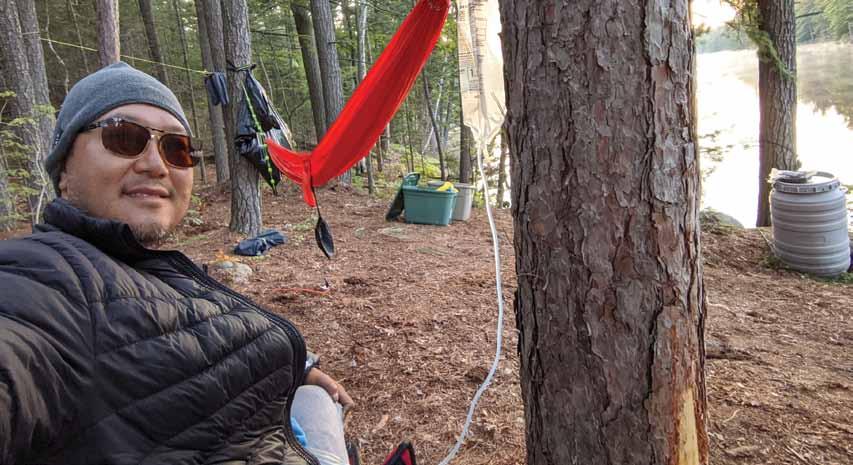
4 minute read
You’re Not Alone
BigStock.com
The importance of peer support
Advertisement
by Heidi Westfield
When Dan’s kidney function started to fall below 20 percent, he and his wife Joan grew very concerned. The Niagara, Ontario couple looked for ways to learn more about renal diets and how to manage Dan’s condition. Last spring, they began taking part in Kidney Connect peer support meetings, organized by The Kidney Foundation. Once a month they log on to an online session and join a virtual group discussion.
“I think it is good for people with any stage of kidney disease to meet with others going through a similar experience,” Dan says, noting he is especially happy that his wife can also take part. “Some people at the meetings have kidney transplants, while others are on dialysis. It is not an intimidating group, and no one is put on the spot. It is very upbeat and positive.”
Dan and Joan’s group is one of several virtual peer support meetings taking place across the province. Everyone is welcome, and you can connect either by phone or by video conference. There were also in-person groups, but they are now on hold due to the COVID-19 pandemic. At a time when people are living with more isolation and anxiety, the online groups offer both emotional support and practical advice.
Michele is 30 years old, and lives in Toronto. She joined a virtual peer support group after being hospitalized with end-stage kidney disease. The diagnosis “came out of nowhere,” and the meetings have helped
her manage the transition to dialysis.
“It is good to hear other people’s stories and know you are not alone,” she says. “It is a diverse group, with some younger members and some older. Some people are there to learn more about options for dialysis and transplants. Others are looking to better understand how to continue working while on dialysis.”
Group sessions are just one place to find help and support. The Kidney Foundation also offers one-on-one phone sessions with trained volunteers. For those who prefer online forums, there is KidneyConnect.ca. The site provides a safe and respectful place to share experiences and learn more about ways to manage renal issues.
No matter where you are on your journey with kidney disease, help is available. Call 1-866-390-

You’re not alone.
Speak to a peer support volunteer who understands what it’s like to live with kidney disease.
We’ve been there too.
kidney.ca | 1 866 390 7337
7337 or email our Programs team at ontario.programs@kidney.ca for information about group meeting registration or to arrange a peer support connection.
The Value of One. The Power of Many.
National Volunteer Week April 18-24, 2021






Volunteers Bring Change. Thank you for your time and dedication. Visit kidney.ca/volunteer or call 1.800.387.4474 to learn more about volunteering.
Happy Camper

How I found a way to keep camping while on dialysis
by Loi Nguyen with Heidi Westfield
Iam 45 years old and live with polycystic kidney disease. A couple of years ago, my kidney function started to drop very quickly. It fell from about 40 percent to 10 percent. Before that, I had been trending down slowly. I was in shock and couldn’t believe this was happening to me; I didn’t think that in my 40s I would be starting dialysis.
I began training for peritoneal dialysis (PD) in November 2019. After the initial shock subsided, I started thinking of ways that I could continue to enjoy the outdoors while on dialysis. I am hard-wired to go camping. I have been doing it for 25 years, and love every aspect of it. I love prepping for it. I love looking at gear, I love watching other people camp on YouTube. So, there was no doubt in my mind I was going to continue camping. It was just a matter of how I could make this happen. How could I do this safely?
During dialysis training, they show you how to use the manual PD bags for exchanges. I suspected that was the key to completing treatments on a camping trip. Last spring, I started taking my canoe on short day trips to build up my energy levels and strength. Then last July, a friend suggested we go camping up north. We drove to Restoule Provincial Park and moved our gear to our boats. From there, we travelled by canoe and found a site in the back country to set up camp.
I brought along three days’ worth of PD bags, and a sturdy mesh tent. I knew the tent would not collapse when I hung my PD bags for the exchanges. I fashioned a tarp over the tent, to be protected from the rain and continue to have airflow. I was comfortable doing all my treatments in the tent and the trip was a success. I plan to continue camping in this way next summer.
My advice to others is never to give up on the things that you love. I really believe that for anybody who is about to go on dialysis or is on dialysis you can still live a great life.










